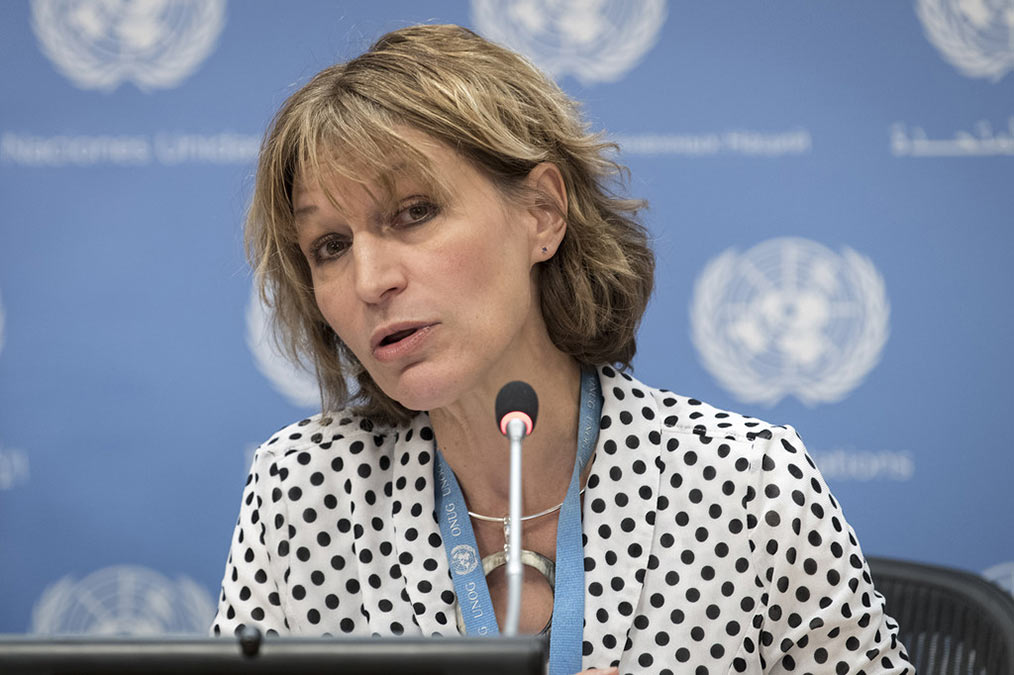The fight against extrajudicial, summary or arbitrary executions in the world: issues and challenges
By Ms Agnès CALLAMARD, Special Rapporteur of the United Nations Human Rights Council (UN).
The conference took place on Tuesday 23 February 2021 from 2 to 4 pm. The ESD R3C would like to thank again its partners for their support and presence at the conference : Ecole de Guerre, the René Cassin Foundation, the Jean Jaurès Foundation, the Fondation Maison des Sciences de l'Homme, Trial international, the Troyes University of Technology - Global Security Chair and the CERDACCF - Côte d'Azur University.
Welcomed by Professor Alain BAUER, Scientific Head of the Security Defence Intelligence Criminology Cyber Threats Crime Pole, and representing the directors of ESD R3C, Ms. CALLAMARD began her introduction by addressing the broad panorama of themes on which her action focused during her mandate as Special Rapporteur of the United Nations Human Rights Council. Since her appointment in August 2016, her work has been punctuated by major crises such as the assassination of Jamal Khassoggi in October 2018 or the targeted drone attack on Qassem Soleimani and the Ukrainian plane shot down by the Iranian armed forces in early January 2020. Then, since the proliferation of the terrorist threat and the emergence of the COVID-19 pandemic, the implementation of states of exception has fuelled a new confrontation between respect for fundamental rights and the protection of citizens.
The core of the Rapporteur's action in this context concerns extrajudicial, summary or arbitrary executions, commonly understood as belonging to the framework of action of a State whose force would be exercised on a limited public. However, new threats - military, environmental, health - are emerging to human security.
The coronavirus crisis, rising tensions between the United States and China, the increasing use of drones, the shortcomings of existing international instruments, such as the conventions for the protection of civil aviation, and climate change are all sources of instability in international relations that require a renewal of the regulatory framework for the protection of civilian populations.
Climate change in a growing number of regions is drying up the access of certain communities and professions to vital resources, thus undermining the socio-economic and political stability of these societies. While the proliferation of armed groups, particularly jihadist groups, is rooted in political and social dilemmas, local conflicts are also increasingly rooted in resource scarcity. It is therefore crucial to integrate these dimensions into the development of public policies, particularly security and counter-terrorism policies.
Moreover, the securing of emergency policies and the progressive integration of these measures into ordinary law must, in the Rapporteur's view, generate a renewal of legal debates on the assessment of the proportionality of measures taken by States. In the context of the fight against COVID-19, the case law of the European Court of Human Rights provides initial answers as to the definition of state responsibility for arbitrary deprivation of the right to life. These reflections need to be pursued.
Similarly, the international framework for action on disarmament ensures limited control over the proliferation and use of drone technology, which is now available to both state and non-state actors. This modus operandi, which is common in extrajudicial executions, complicates the attribution of responsibility and requires the creation of new instruments to protect civilian populations.
It is therefore necessary to establish a multilateral legal framework defining the regime for the design, export and use of UAVs, as well as controls on the transfer of military and dual-use technologies.
Moreover, legal and moral questions are emerging as to the extent of the responsibility of armed groups to protect human rights. Ms CALLAMARD explained to the audience her innovative investigation method, which combines human rights law, which focuses on State responsibility, and criminal law, which emphasises individual criminal responsibility. In her view, more work should be done on individual criminal responsibility. Although the concept of "responsibility to protect" is not new, the Rapporteur encourages a rethinking of the concept by deepening the human rights normative framework and its application to situations other than those directly related to intentional State action. The protection of human rights in the face of excessive, disproportionate and arbitrary use of force, in particular by public and private actors (private security companies, for example), pre-empts and thus cuts across issues ranging from targeted assassinations, armed conflicts to the management of the Covid crisis and feminicide.
An exchange coordinated by Mr Guillaume SOTO MAYOR, ESD R3C, then allowed a dialogue with many listeners in visio.
ESD R3C would like to thank Mrs. Agnès CALLAMARD, the organizing partners and the listeners present.

